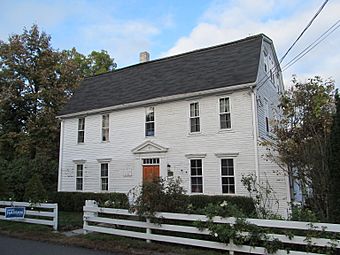Maj. John Gilman House facts for kids
Quick facts for kids |
|
|
Maj. John Gilman House
|
|
 |
|
| Location | 25 Cass St., Exeter, New Hampshire |
|---|---|
| Area | 1.2 acres (0.49 ha) |
| Built | 1738 |
| Architectural style | Georgian |
| NRHP reference No. | 88000659 |
| Added to NRHP | June 14, 1988 |
The Maj. John Gilman House is a very old and important house located at 25 Cass Street in Exeter, New Hampshire. It was built way back in 1738. This house is a great example of a special building style called Georgian. It has a unique "gambrel" roof, which means it has two slopes on each side. The house is also famous because of its connection to the powerful Gilman family. It was added to the National Register of Historic Places in 1988, which means it's recognized as a significant historical site.
Contents
About the Gilman House
This historic house stands north of Exeter's main downtown area. It is a two-and-a-half-story building made of wood. The outside is covered with horizontal wooden boards called clapboards.
What Does It Look Like?
The front of the house has five sections, with the main door in the middle. The door is decorated with flat, column-like shapes called pilasters. Above the door, there is a small window called a transom and a triangular shape called a pediment.
The windows on the ground floor have small decorative ledges above them. The windows on the second floor are placed right under the roof's edge. The windows you see today were likely changed around 1830. They are taller and narrower than windows from the original Georgian period. Inside, the house was carefully restored in the 1960s. This restoration made it look just like it did in the 1700s.
History of the House
The house was built in 1738 by Colonel John Gilman. He built it for his son, who was also named John. The elder Colonel Gilman lived in a nearby house called the Gilman Garrison House. His son, Major John Gilman, was born there.
This house is one of only three gambrel-roofed houses from the Georgian period that still exist in Exeter. It is also the one that has been changed the least over time. Both Colonel John Gilman and his son, Major John Gilman, were important people in the local military and town government.
Later, the house was home to Thomas Odiorne. He was Major Gilman's son-in-law. Thomas Odiorne was a successful businessman. He made equipment and parts for sailing ships.
Caesar Nero Paul's Story
Major John Gilman had an enslaved African boy named Caesar Nero Paul. Caesar was about fourteen years old and worked as a house-boy in this home. Caesar later went with Major Gilman to the French and Indian Wars. During the war, he was captured.
After being captured, Caesar returned to Exeter in 1771. He then lived as a free man. Caesar married a woman named Lovey Rollins. They had several children who became very important. Their son, Rev. Thomas Paul, became a famous Baptist minister. Two other sons also became ministers.
Caesar's daughter, Rhoda, married Jude Hall. Jude Hall was a noted Black soldier who fought in the Revolutionary War. Another daughter, Nancy, was the mother of James Monroe Whitfield. James Monroe Whitfield became a well-known Black poet and activist who fought against slavery.



